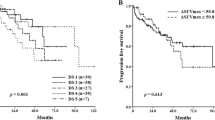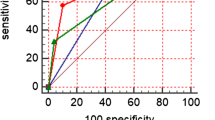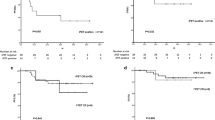Abstract
Background
[18F] fluorodeoxyglucose-positron emission tomography is incorporated in response criteria currently used for lymphoma; however, the primary endpoint in earlier phase study is an overall response, which includes the partial response of 50% shrinkage in two dimensions. Therefore, the measurement of target lesions is still prerequisite to determine the destiny of new, promising agents. Since required is calculating the sum of the product of bidimensional diameters of maximal six target lesions, the International Workshop Criteria (IWC) used as response evaluation in lymphoma is more time-consuming than the Response Evaluation Criteria in Solid Tumors (RECIST). This study aimed to examine whether the RECIST could replace the IWC using data from a phase II/III study of R-CHOP-21 versus R-CHOP-14 for advanced-stage indolent B-cell lymphoma, JCOG0203.
Methods
To evaluate the degree of agreement between them, the Kappa coefficient (KC) was calculated. Excluding patients without target lesions for the RECIST following central pathological review, 269 patients were evaluable. We determined which criterion was more predictive for progression-free survival. The criterion showing the lower point estimate of the hazard ratio (HR) of a complete response (CR) vs. a non-CR was defined as more useful.
Results
The KC between them was 0.34 (95% confidence interval [CI] 0.26–0.42); namely, indicating poor agreement. The HR of the IWC (0.47: 95% CI 0.33–0.68, log-rank test p < 0.001) was lower than that of the RECIST (0.64: 95% CI 0.45–0.89, p = 0.0075).
Conclusion
We conclude that unidimensional measurements cannot be substituted for the bidimensional ones for indolent lymphoma.


Similar content being viewed by others
References
Cheson BD, Horning SJ, Coiffier B et al (1999) Report of an International Workshop to standardize response criteria for non-Hodgkin’s lymphomas. J Clin Oncol 17:1244–1244
Cheson BD, Pfistner B, Juweid ME et al (2007) Revised response criteria for malignant lymphoma. J Clin Oncol 25:579–586
Cheson BD, Fisher RI, Barrington SF et al (2014) Recommendations for initial evaluation, staging, and response assessment of Hodgkin and non-Hodgkin lymphoma: the Lugano Classification. J Clin Oncol 32:3059–3067
Cheson BD, Ansell S, Schwartz L et al (2016) Refinement of the Lugano Classification lymphoma response criteria in the era of immunomodulatory therapy. Blood 128:2489–2496
Schuster SJ, Svoboda J, Chong EA et al (2017) Chimeric antigen receptor T cells in refractory B-cell lymphomas. N Engl J Med 377:2545–2554
Sehn LH, Goy A, Offner FC et al (2015) Randomized phase II trial comparing obinutuzumab (GA101) with rituximab in patients with relapsed CD20+ indolent B-Cell non-Hodgkin lymphoma: final analysis of the GAUSS Study. J Clin Oncol 33:3467–3474
Morschhauser F, Le Gouill S, Feugier P et al (2019) Obinutuzumab combined with lenalidomide for relapsed or refractory follicular B-cell lymphoma (GALEN): a multicentre, single-arm, phase 2 study. Lancet Haematol 6:e429–e437
Eisenhauer EA, Therasse P, Bogaerts J et al (2009) New response evaluation criteria in solid tumours: revised RECIST guideline (version 1.1). Eur J Cancer 45:228–247
Watanabe T, Tobinai K, Shibata T et al (2011) Phase II/III study of R-CHOP-21 versus R-CHOP-14 for untreated indolent B-cell non-Hodgkin’s lymphoma: JCOG 0203 trial. J Clin Oncol 29:3990–3998
Watanabe T, Tobinai K, Wakabayashi M et al (2018) Outcomes after R-CHOP in patients with newly diagnosed advanced follicular lymphoma: a 10-year follow-up analysis of the JCOG0203 trial. Lancet Haematol 5:520–531
Trotman J, Fournier M, Lamy T et al (2011) Positron emission tomography-computed tomography (PET-CT) after induction therapy is highly predictive of patient outcome in follicular lymphoma: analysis of PET-CT in a subset of PRIMA trial participants. J Clin Oncol 29:3194–3200
Dupuis J, Berriolo-Riedinger A, Julian A et al (2012) Impact of [18F] fluorodeoxyglucose Positron emission tomography response evaluation in patients with high–tumor burden follicular lymphoma treated with immunochemotherapy: a prospective study from the Groupe d’Etudes des Lymphomes de l’Adulte and GOELAMS. J Clin Oncol 30:4317–4322
Assouline S, Meyer RM, Infante-Rivard C et al (2007) Development of adapted RECIST criteria to assess response in lymphoma and their comparison to the International Workshop Criteria. Leuk Lymphoma 48:513–520
Younes A, Hidden P, Coiffier B et al (2017) International Working Group consensus response evaluation criteria in lymphoma (RECIL 2017). Ann Oncol 28:1436–1447
Chiou VL, Burotto M (2015) Pseudoprogression and immune-related response in solid tumors. J Clin Oncol 33:3541–3543
Morchhauser F, Fowler NH, Feugier P et al (2018) Rituximab plus lenalidomide in advanced untreated follicular lymphoma. New Engl J Med 379:934–947
Houotr R, Cartron G, Bijou F et al (2019) Obinutuzumab plus lenalidomide (GALEN) for the treatment of relapse/refractory aggressive lymphoma: a phase II LYSA study. Leukemia 33:776–780
Acknowledgements
The authors are grateful to patients who participated in JCOG0203, attending physicians of the Hospital, and the members of Lymphoma Study Group of JCOG and to the member of the JCOG operations office for his support in preparing manuscript and this study (Dr Hideaki Kitahara).
Funding
This work was supported in part by the National Cancer Center Research and Development Fund (26-A-4, 29-A-3).
Author information
Authors and Affiliations
Corresponding author
Ethics declarations
Conflict of interest
KM: No conflicts to disclose. TW: Received honoraria from Bristol-Meyers Squibb, AstraZeneca Pharmaceutical, and Chugai Pharmaceutical, received funding resources from Takara Bio Inc, United Immunity, Co., Ltd., and BrightPath Biotherapeutics Co., Ltd. MW: No conflicts to disclose. KN: No conflicts to disclose. YW: No conflicts to disclose. DM: Received patent licensing fees from Mundi Pharma, Janssen Pharmaceutical, Chugai Pharmaceutical, Eisai, received research funding from Mundi Pharma, Janssen Pharmaceutical, Chugai Pharmaceutical, Eisai, Ono Pharmaceutical, Celgene, AbbVie. KT: Advisory role of Mundi Pharma, Zenyaku Kogyo, HUYA Bioscience International, Daiichi Sankyo, Ono Pharmaceutical, Takeda Pharmaceutical, received honoraria from Mundi Pharma, Zenyaku Kogyo, HUYA Bioscience International, Eisai, Kyowa Kirin, Ono Pharmaceutical, Takeda Pharmaceutical, Celgene, and Chugai Pharmaceutical, received research funding from Mundi Pharma, Kyowa Kirin, Janssen Pharmaceutical, Chugai Pharmaceutical, Eisai, Ono Pharmaceutical, Celgene, Takeda Pharmaceutical, AbbVie. KT: Advisory role of HUYA Bioscience International, Daiichi Sankyo, Ono Pharmaceutical, received honoraria from Mundi Pharma, Eisai, Kyowa Kirin, Bayer, Takeda Pharmaceutical, Celgene, and Chugai Pharmaceutical, received research funding from Daiichi Sankyo, HUYA Bioscience International, Chugai Pharmaceutical, Eisai, Bayer, Celgene. HF: No conflicts to disclose.
Additional information
Publisher's Note
Springer Nature remains neutral with regard to jurisdictional claims in published maps and institutional affiliations.
About this article
Cite this article
Miyamoto, K., Watanabe, T., Wakabayashi, M. et al. Comparison of the International Workshop Criteria and the Response Evaluation Criteria in Solid Tumors for indolent B-cell lymphoma. Int J Clin Oncol 26, 429–437 (2021). https://doi.org/10.1007/s10147-020-01800-z
Received:
Accepted:
Published:
Issue Date:
DOI: https://doi.org/10.1007/s10147-020-01800-z




